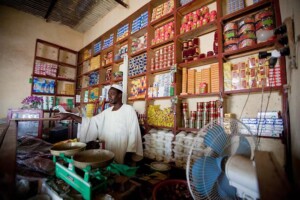OCHA reports: Food prices continue to rise, a bad omen for displaced people
Food prices continued to rise across Sudan in April, albeit at a lower rate compared to previous months, the World Food Programme (WFP) reported in its latest Market Monitor update (see full report here).
 Sudanese market goods (RD file photo)
Sudanese market goods (RD file photo)
The UN Office for the Coordination of Humanitarian Affairs (OCHA) wrote that food prices continued to rise across Sudan in April, albeit at a lower rate compared to previous months, based on World Food Programme (WFP) latest Market Monitor update (see full report here).
In April, the national average cost of a local food basket increased by 1.8 per cent compared to March 2021 and was recorded at SDG152 (about US$0.37). The national average retail price of sorghum was SDG98.5/kg ($0.24/kg), which is a slight increase of 0.3 per cent compared to March. The retail price of wheat flour was SDG272.2/kg ($0.67/kg) – an increase of 3.9 per cent compared to March 2021. The average retail price of a goat was SDG9,648/head ($23.65/head), which is an increase of 12.9 per cent compared with the previous month.
For Mohammed (not his real name), this is bad news as they mean things are getting more difficult. Mohammed was displaced from his ancestral village and arrived in the West Darfur capital El Geneina when the conflict started in Darfur in 2003. When he came to El Geneina he was around 30 and now is in his mid-50s, with his seven-member family.
"We used to have a simple but comfortable life before the meshakil [conflict-trouble] started in 2003"
“We used to have a simple but comfortable life before the meshakil [conflict-trouble] started in 2003. We were farming, but also had some sheep, goats, and cows. We would slaughter them when we needed and we always had milk,” Mohammed said.
“After we came to El Geneina, we had to pay for everything. We still do some farming during the planting season, but we cannot rear livestock anymore. It is not safe to graze them outside of El Geneina,” he added.
This means he has to buy meat from the butcher and pay more than 1,500 SDG per kilo ($3.68/kg), which is difficult for him to afford as his monthly salary is 9,000 SDG (about $22) per month. “The food prices are increasing every day. The kilo of meat costs almost the same as in Khartoum. How do you think we can afford it?” he asked.
“The food prices are increasing every day. The kilo of meat costs almost the same as in Khartoum. How do you think we can afford it?"
He spends daily at least 200 SDG (about $0.50) for his fatur (late breakfast/early lunch) and works 14 days per month. His fatur costs about one-third of his monthly salary.
Many other IDPs across Sudan are in a similar situation. A little over half of IDPs across Sudan are food insecure, according to WFP’s Food Security Monitoring Sytems (FSMS) report for the 1st quarter of 2021. The areas with the highest prevalence of food insecurity include refugee and IDP communities in Darfur, the Kordofan states, and the Blue Nile state. Economic vulnerability is cited as a major factor as 96 per cent of IDP families are spending more than 65 per cent of their total expenditure on food, the FSMS report said.
Meanwhile, on 18 May, the Central Bureau of Statistics reported that the April inflation rate in Sudan increased from 342 per cent in March to 363 per cent. The economic crisis and inflation are the main drivers of the increase in the number of people in need, according to the 2021 Humanitarian Needs Overview. Humanitarian organisations are advocating for early and flexible funding for the 2021 Humanitarian Response Plan.
This article was originally published by UN OCHA. You can find it here.











 and then
and then